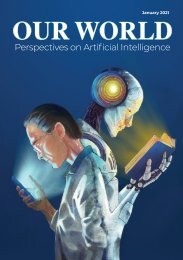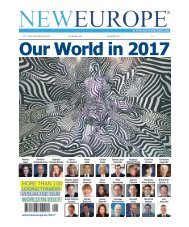Our World in 2018
Leading minds reflect on the state of our societies, and examine the challenges that lie ahead. An edition dedicated to generating ideas that will help form a new vision for our world.
Leading minds reflect on the state of our societies, and examine the challenges that lie ahead. An edition dedicated to generating ideas that will help form a new vision for our world.
Create successful ePaper yourself
Turn your PDF publications into a flip-book with our unique Google optimized e-Paper software.
GLOBAL VS. LOCAL WORLDS
and even young managers ended his
successor’s military rule.
With the candlelight revolution,
Koreans have elevated their democracy
to another level. But the challenge they
face is formidable. The protesters were
calling for more than just the ousting
of an errant president and her cronies:
They want to create a cleaner and fairer
society.
The most immediate challenge
Koreans face is that of ridding the
political system of corruption.
Illicit dealings among politicians,
family-controlled business empires
— are common. This August, Lee Jaeyong,
the de facto head of Samsung,
one of the most prominent chaebols,
for bribing Park and her notorious
C.
Some believe that corruption can
be eliminated by further deregulation,
with the idea that this would reduce
the number of opportunities for
strengthening minority shareholder
rights, on the theory that shareholders
will expose corrupt dealings by those
who run the chaebols. However, a
much more fundamental shift in the
distribution of power is required if
there is to be a reduction in corruption.
Decision-making abilities need to
be transferred from the political
and business elites to citizens, civic
organizations, trade unions, and other
“countervailing powers,” to borrow an
expression from the economist John
Kenneth Galbraith.
Then there is the issue of fairness.
Increasing deregulation has reduced
protections for small factories and
shops, which used to supply jobs that
kept income inequality relatively low.
The spread of American-style salary
norms in the past decade or so has
led to a tremendous increase in wage
inequality — South Korea has one
of the fastest-growing levels among
the countries in the Organization
for Economic Cooperation and
Development.
But what angers South Koreans
most is the marked drop in social
mobility and the sense of hopelessness
that haunts young people from less
privileged backgrounds — that is, most
young people.
This lack of social mobility is
sometimes the result of blatantly
corrupt practices. Of all the corruption
scandals the former president faces,
particularly upsetting for many was
.C
Ewha Womans University in Seoul, one
of the nation’s leading universities,
to accept Ms. Choi’s daughter at the
expense of candidates who were better
.
The barriers to university applicants
are usually subtle. It’s the extras that
make a candidate for admission stand
out, such as extracurricular activities or
expensive private tutoring for university
entrance exams. At the beginning
of their careers, expectations that
candidates have completed internships
may stand in the way. Poor parents
cannot even dream of helping their
children with such things.
Many young Koreas believe,
rightly, that equality of
opportunity is impossible in
the face of ostensibly fair rules that
favor the daughters and sons of the
rich and the powerful.
Removing these barriers to social
reducing corruption. Big changes in
the education system are needed, and
especially in the university application
process.
This will also require the expansion
of the welfare state so that children
from less privileged backgrounds
can have a chance at moving up the
social ladder through early learning
programs, publicly-funded enrichment
schemes, and the increased parental
attention and family stability that extra
income can provide.
Koreans have shown the world
that an engaged citizenry, armed with
the latest technologies, can work a
democratic miracle. That miracle will
fade away and people will become
disillusioned with democracy if our
government does not deliver a cleaner
and fairer society soon.
Many young South Koreans say they worry about their prospects in a
country hobbled by increasing household debt, high youth unemployment
and stagnant wages. Students at Pungmoon Girls High School in Seoul.
Ed Jones/Agence France-Presse — Getty Images.
OUR WORLD | 2018
© 2018 Ha-Joon Chang. Distributed by The New York Times Syndicate
147










